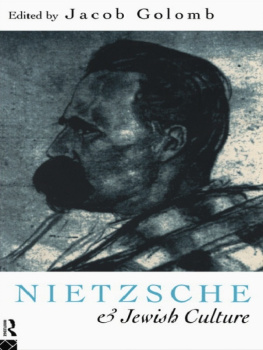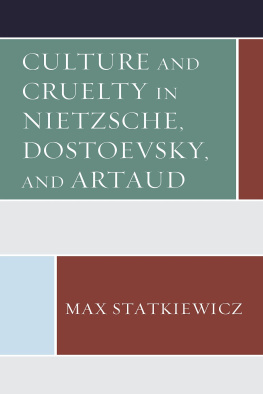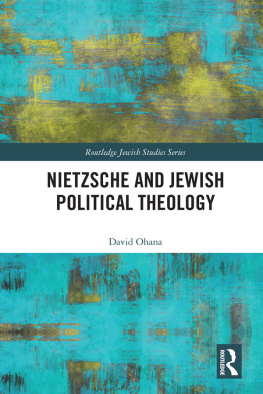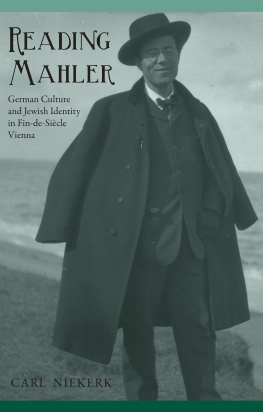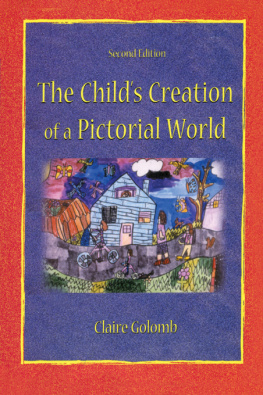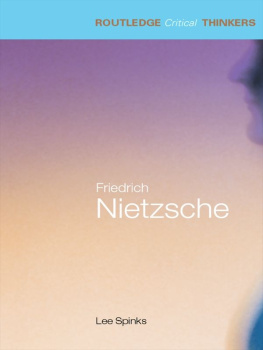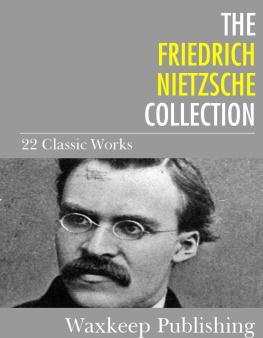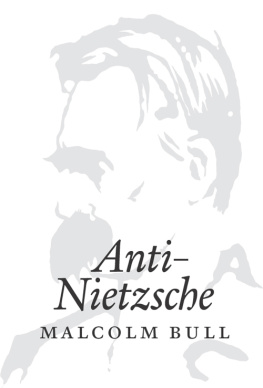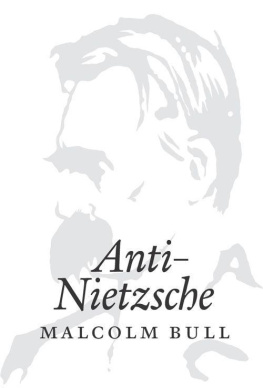Golomb Yaʻaḳov - Nietzsche and Jewish Culture
Here you can read online Golomb Yaʻaḳov - Nietzsche and Jewish Culture full text of the book (entire story) in english for free. Download pdf and epub, get meaning, cover and reviews about this ebook. City: London;Juden, year: 1997;2011, publisher: Routledge, genre: Religion. Description of the work, (preface) as well as reviews are available. Best literature library LitArk.com created for fans of good reading and offers a wide selection of genres:
Romance novel
Science fiction
Adventure
Detective
Science
History
Home and family
Prose
Art
Politics
Computer
Non-fiction
Religion
Business
Children
Humor
Choose a favorite category and find really read worthwhile books. Enjoy immersion in the world of imagination, feel the emotions of the characters or learn something new for yourself, make an fascinating discovery.
- Book:Nietzsche and Jewish Culture
- Author:
- Publisher:Routledge
- Genre:
- Year:1997;2011
- City:London;Juden
- Rating:4 / 5
- Favourites:Add to favourites
- Your mark:
- 80
- 1
- 2
- 3
- 4
- 5
Nietzsche and Jewish Culture: summary, description and annotation
We offer to read an annotation, description, summary or preface (depends on what the author of the book "Nietzsche and Jewish Culture" wrote himself). If you haven't found the necessary information about the book — write in the comments, we will try to find it.
Nietzsche and Jewish Culture — read online for free the complete book (whole text) full work
Below is the text of the book, divided by pages. System saving the place of the last page read, allows you to conveniently read the book "Nietzsche and Jewish Culture" online for free, without having to search again every time where you left off. Put a bookmark, and you can go to the page where you finished reading at any time.
Font size:
Interval:
Bookmark:

Friedrich Nietzsche occupies a contradictory position in the history of ideas: he came up with the concept of a master race, yet an eminent Jewish scholar like Martin Buber translated his Also Sprach Zarathustra into Polish and remained in a lifelong intellectual dialogue with Nietzsche. Sigmund Freud admired his intellectual courage and was not at all reluctant to admit that Nietzsche had anticipated many of his basic ideas.
This unique collection of essays explores the reciprocal relationship between Nietzsche and Jewish culture. It is organized in two parts: the first examines Nietzsches attitudes towards Jews and Judaism: the second Nietzsches influence on Jewish intellectuals as diverse and as famous as Franz Kafka, Martin Buber, Franz Rosenzweig and Sigmund Freud. Each carefully selected essay explores one aspect of Nietzsches relation to Judaism and German intellectual history, from Heinrich Heine to Nazism.
Jacob Golomb teaches philosophy at the Hebrew University, Jerusalem, and acts as Philosophical Editor of the Hebrew University Magnes Press. His books include Nietzsches Enticing Psychology of Power (1989) and In Search of Authenticity from Kierkegaard to Camus (1995).
First published 1997
by Routledge
11 New Fetter Lane, London EC4P 4EE
Simultaneously published in the USA and Canada
by Routledge
29 West 35th Street, New York, NY 10001
This edition published in the Taylor & Francis e-Library, 2001.
1997 Jacob Golomb
All rights reserved. No part of this book may be reprinted or reproduced or utilized in any form or by any electronic, mechanical, or other means, now known or hereafter invented, including photocopying and recording, or in any information storage or retrieval system, without permission in writing from the publishers.
British Library Cataloguing in Publication Data
A catalogue record for this book is available from the British Library
Library of Congress Cataloguing in Publication Data
Nietzsche and Jewish culture / edited by Jacob Colomb.
p.cm.
Includes bibliographical references and index.
1. Nietzsche, Friedrich Wilhelm, 18441900Views on Judaism. 2. Nietzsche, Friedrich Wilhelm, 18441900Influence. 3. JewsGermanyIntellectual life. 4. GermanyIntellectual life20th century
I. Golomb, Jacob.
B3318.J83N54 1996
193dc20 9542115
ISBN 0-415-09512-3 (hbk)
ISBN 0-415-09513-1 (pbk)
ISBN 0-203-02813-9 Master e-book ISBN
ISBN 0-203-17428-3 (Glassbook Format)
Steven E. Aschheim teaches German Cultural and Intellectual History at the Hebrew University, Jerusalem. He is the author of Brothers and Strangers: The East European Jew in German and German-Jewish Consciousness (1982), The Nietzsche Legacy in Germany (1992) and Culture and Catastrophe: German and Jewish Confrontation with National Socialism and other Crises (1996).
Hubert Cancik teaches Classics at Eberhard-Karls-Universitt, Tbingen. He is the author of Untersuchungen zur lyrischen Kunst des P. Papinius Statius (1965), Grundzge der hethitischen und alttestamentlichen Geschichtschreibung (1976), Nietzsches Antike (1995) and has edited Markus-Philologie (1984) and Handbuch religionswissenschaftlicher Grundbegriffe (1988).
Stanley Corngold is Professor of German and Comparative Literature at Princeton University. He is the author of The Fate of the Self: German Writers and French Theory (1986), Franz Kafka: The Necessity of Form (1988), Borrowed Lives (with Irene Giersing, 1991) and Complex Pleasure: Forms of Feeling in German Literature (forthcoming).
Sander L. Gilman is Henry R. Luce Professor of the Liberal Arts in Human Biology at the University of Chicago. He is a cultural and literary historian and the author or editor of over forty books, the most recent in English on Jews in Todays Germany (1995). He is the president of the Modern Language Association.
J acob Golomb teaches philosophy at the Hebrew University, Jerusalem and is the philosophical editor of the Hebrew University Magnes Press. Among his books are Nietzsches Enticing Psychology of Power (1989), Introduction to Philosophies of Existence (1990) and In Search of Authenticity from Kierkegaard to Camus (1995).
Peter Heller is Professor Emeritus in German and Comparative Literature at the State University of New York in Buffalo, USA. Publications on Nietzsche and Freud include Von den ersten und letzten Dingen: Studien und Kommentar zu einer Aphorismenreihe von F. Nietzsche (1972) and Studies on Nietzsche (1980).
William J. McGrath is Professor of History at the University of Rochester, New York. He is the author of Dionysian Art and Populist politics in Austria (1974) and Freuds Discovery of Psychoanalysis: The Politics of Hysteria (1986).
Paul Mendes-Flohr is Professor of Jewish Intellectual History and Modern Jewish Philosophy at the Hebrew University. He is the author of From Mysticism to Dialogue. Martin Bubers Transformation of German Social Thought (1989) and Divided Passions. Jewish Intellectuals and the Experience of Modernity (1990), and is the co-editor of the new twenty-one volume Jewish edition of Martin Bubers Collected Works.
Weaver Santaniello is Assistant Professor of Philosophy at Penn State University, Berks Campus. She is the author of Nietzsche, God, and the Jews (1994) and is currently co-editing a collection of essays on Nietzsche and depth psychology.
Gary Shapiro is Tucker-Boatwright Professor in the Humanities and Professor of Philosophy at the University of Richmond, USA. He is the author of Nietzschen Narratives (1989), Alcyone: Nietzsche on Gifts, Noise, and Women (1991) and Earthwards: Robert Smithson and Art After Babel (1995).
Josef Simon is the director of philosophisches Seminar A, University of Bonn. He is the author of Das Problem der Sprache bei Hegel (1966), Sprache und Raum (1969), Philosophie und linguistische Theorie (1971), Wahrheit als Freiheit (1978), Sprachphilosophie (1981) and Philosophie des Zeichens (1989).
Yirmiyahu Yovel is Professor of Philosophy at the Hebrew University, Jerusalem and at the New School for Social Research, New York, and is chair of the Jerusalem Spinoza Institute. Among his books are Kant and the Philosophy of History (1980), Spinoza and Other Heretics (1989) and Dark Riddle: Hegel and Nietzsche on Judaism (1996).
Celebrating the hundreth anniversary of the birth of Friedrich Nietzsche in Weimar on 15 October 1944, Alfred Rosenberg, the Reichsleiter, declared in an official speech: In a truly historical sense, the National Socialist movement eclipses the rest of the world, much as Nietzsche, the individual, eclipsed the powers of his times. in which he made some remarks with nasty anti-Semitic connotations. In response, some Israeli and German Jewish scholars, myself among them, declined to participate in the conference if Nolte would be there. In the end, the conference was cancelled. However, its subject is far too important to let people such as Nolte have the last word. Fortunately, some of the present contributors were to participate in that conference. It is therefore our sincere hope that by explicating Nietzsches views on Jews and presenting his Jewish legacy this volume might discourage in the future any manipulations of his writings by movements to which he was diametrically opposed.
Font size:
Interval:
Bookmark:
Similar books «Nietzsche and Jewish Culture»
Look at similar books to Nietzsche and Jewish Culture. We have selected literature similar in name and meaning in the hope of providing readers with more options to find new, interesting, not yet read works.
Discussion, reviews of the book Nietzsche and Jewish Culture and just readers' own opinions. Leave your comments, write what you think about the work, its meaning or the main characters. Specify what exactly you liked and what you didn't like, and why you think so.

